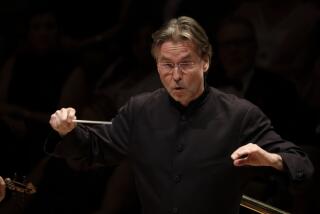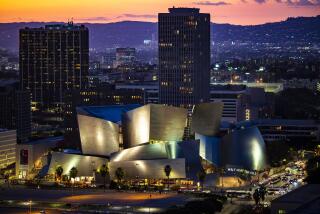Classical concerts to soothe a coronavirus-rattled soul: Our critic’s streaming picks
For the last few years, my morning ritual has included clicking on to worldconcerthall.com when I first turn on my computer, cappuccino in hand. I do it before I look at The Times or anything else. This site from Barcelona, Spain, is a terrific resource that claims to offer “every online concert in this world.”
They’re not all there, but you will find listings for an average of two dozen concerts broadcast from around the world any given day. A few are live events; the rest tend to be recordings of performances that took place in recent weeks. Most come from Europe, because a number of radio stations in capitals overseas broadcast concerts daily. American stations do so to a lesser extent and are included.
It had long been my intention to take a week or two break from concertgoing and just check out what’s happening around the world. Now, obviously, is that time. It’s been revealing, even revelatory.
Concert life continues en masse on radio. Besides that, everywhere you turn you can find orchestras, concert halls and opera companies streaming from their archives, and now a few are giving live concerts online without an audience.
Ready to watch that Pulitzer-winning play you meant to catch years ago? Want to time-travel to see Angela Lansbury do “Sweeney Todd” in 1982? Here’s how.
The riches are inexhaustible. But, first, beware of what you wish for. These are not normal times and let us not pretend they are. When used as an exercise in intent listening, classical music has the capacity to make you newly sensitive to your environment, while also asking (when not outright insisting) that you confront your feelings.
More and more, it has thrived as an art form that does not respect social distancing. Concert halls are built to be intimate and without a proscenium stage, to make the audience feel closer to the performers. Immersive opera is all the rage. As is headphone listening, which is uniquely intimate — just the music and your brain.
We’ve still got our headphones (no more sharing them, though). But our brains have been rewired by the shocking coronavirus pandemic.
Frankly, I find the recent live concerts without audiences unnerving. The Berlin Philharmonic has made its Digital Concert Hall — the most technologically advanced of all orchestral live video streaming services — free for the time being. It tried playing a performance of Berio’s “Sinfonia,” conducted by Simon Rattle, without an audience Thursday. That meant a hundred or so musicians sitting next to one another. Winds, brass and singers, spraying spittle.
The performance was outstanding, but I couldn’t keep from thinking how unnatural all this was — a little creepy even in the empty hall. Plus, Berio was on the case when he wrote the score in the Bay Area in 1968 as a reaction to all the political turmoil surrounding him. In the third movement, which includes a collage of spoken text, there is this uncanny excerpt from Samuel Beckett’s “The Unnamable”: “That’s the show waiting for the show … and the spectators, where are they, you didn’t notice, in the anguish of waiting, never noticed you were waiting alone.” Near the movement’s end, we hear that “it’s quite hopeless. ... But it can’t go on.”
After that I couldn’t bear another minute. Then Saturday night the Oregon Symphony wised up. It canceled its planned webcast of Berio’s “Sinfonia” for the safety of the orchestra.
Coronavirus canceled individual productions or entire seasons (not to mention all of Broadway). Here’s how some are reopening on a digital stage.
World Concert Hall still has concerts listed. The London Philharmonia waited until Tuesday to cancel Esa-Pekka Salonen’s program with the soprano Lise Davidsen on Thursday night, a program that was supposed to be broadcast on the BBC’s classical music station, Radio 3.
But that still leaves us with a ton of live concerts that will be broadcast and, on the most generous European radio stations, a wealth of archived material — mainly audio but some video from recent performances, as well as video streams of recent opera productions from various sites. It remains very easy to get an idea of what we would be missing even if all of our local halls were full.
It won’t be easy to resist checking your phone while listening or not to have a pit in your stomach knowing that what you’re hearing was then, and this is now. But there are compelling reasons to try.
BBC Radio 3 is where to begin and where you may stay. It plays concert recordings all day long. The sound is the best of any station I’ve encountered. Every program is archived for 30 days. The breadth of offerings is breathtaking. Informative programs are absorbing.
Where else can you go from hearing the 90th anniversary concert of the Slovak Radio Symphony, with a new piece by Vladimir God´ar, who deserves to be more widely known outside of Bratislava, Slovakia, to the L.A.-based Venezuelan pianist Gabriela Montero, improvising in Belfast, Northern Ireland. As I was writing Monday, the station broadcast a live song recital by a robust young singer, Alessandro Fisher, a matinee at London’s Wigmore Hall, given just before the venue announced that all further concerts, including the evening’s program, would be canceled.
Radio France is not nearly so extensive, nor does it have so friendly a website, but it does an admirable job of chronicling French, and particularly Parisian, musical life. In one handsomely produced video from a concert last month, you will find Kent Nagano conducting a powerfully affecting performance of Messiaen’s spiritually effusive “Trois Petites Liturgies de la Présence Divine,” written just after the 1944 liberation of Paris. In another, John Adams conducts his new piano concerto, “Must the Devil Have All the Good Tunes,” with the Icelandic pianist Vikingur Olafsson as soloist. This is a fascinating, different and no less compelling take on the concerto commissioned by the Los Angeles Philharmonic for Yuja Wang and Gustavo Dudamel that was given its premiere at Walt Disney Concert Hall a year ago.
We should not forget our local KUSC, which broadcast that premiere, thank you very much. And you can hop over to Netherlands Radio to hear Adams and Olafsson, where the Dutch premiere of “Devil,” also last month, is archived. While there scroll down the concert listings for the Dutch-only classical song recital “Dirty Minds,” a title that means it. Beyond that, let World Concert Hall be your guide. Before long, you’ll be virtually globe-hopping, the only way we can at the moment.
A special place for opera is the site operavision.eu, which streams for a limited time productions of opera from around Europe. One offering is mind blowing: Jaromir Weinberger’s operetta, “Spring Storms.” This truly weird work — an operetta about, of all things, espionage in Manchuria during the Russo-Japanese War in 1905. It had its premiere in Berlin in 1933. After performances on the nights of Adolf Hitler’s swearing in as chancellor and of the Reichstag fire, the Jewish composer and the Jewish members of the cast quickly fled Germany and “Spring Storms” vanished from the repertory.
The irrepressible director Barrie Kosky has revived it for his Komische Oper in Berlin, and the production — witty, now and then over the top, and ultimately touching — has all the qualities of a dance on the edge of the volcano. Of everything I’ve heard this past week, it most directly hit the nerve of our upcoming spring storms.
More to Read
The biggest entertainment stories
Get our big stories about Hollywood, film, television, music, arts, culture and more right in your inbox as soon as they publish.
You may occasionally receive promotional content from the Los Angeles Times.







